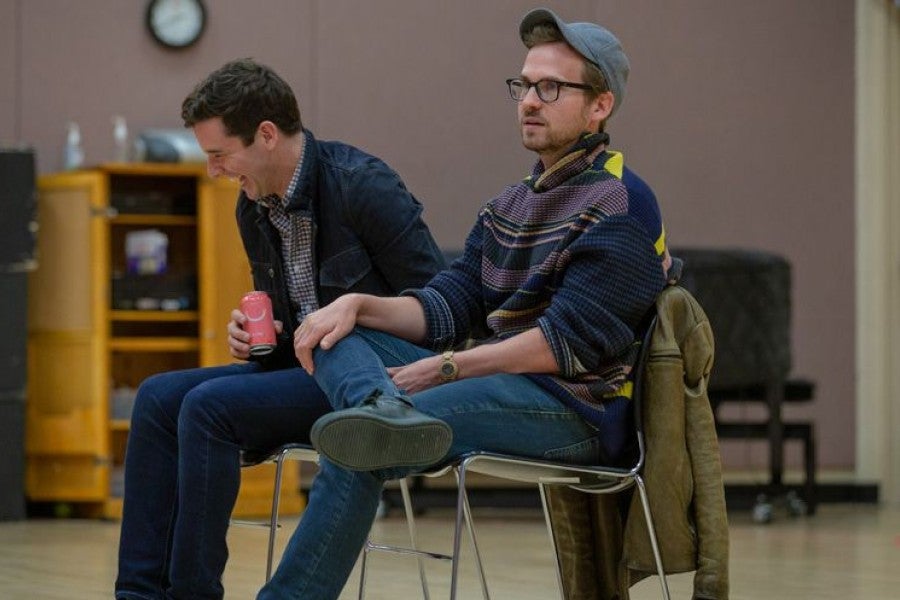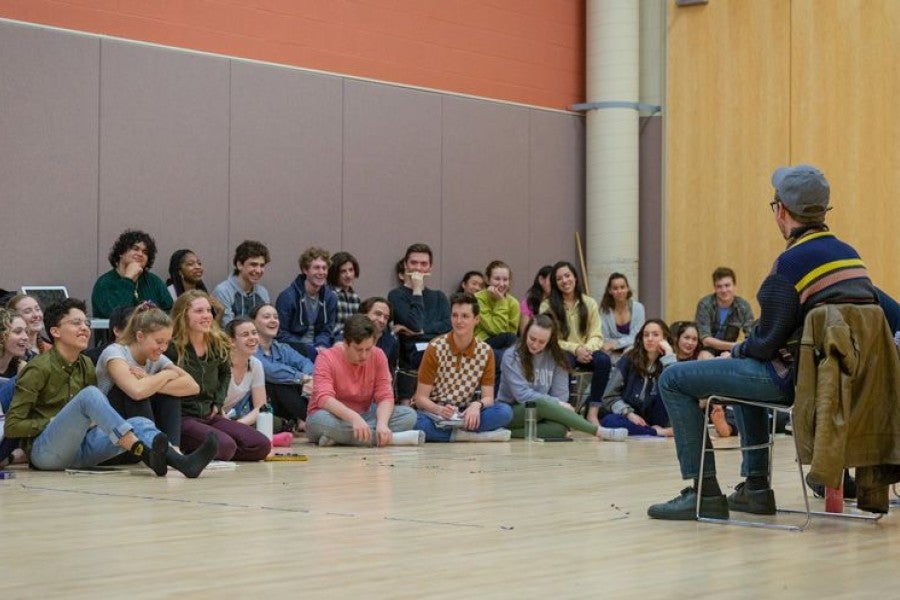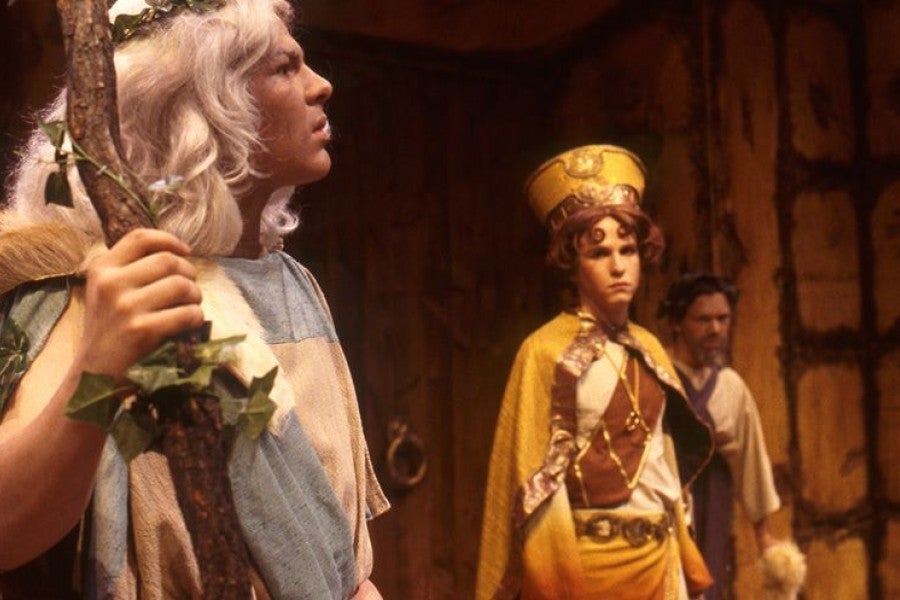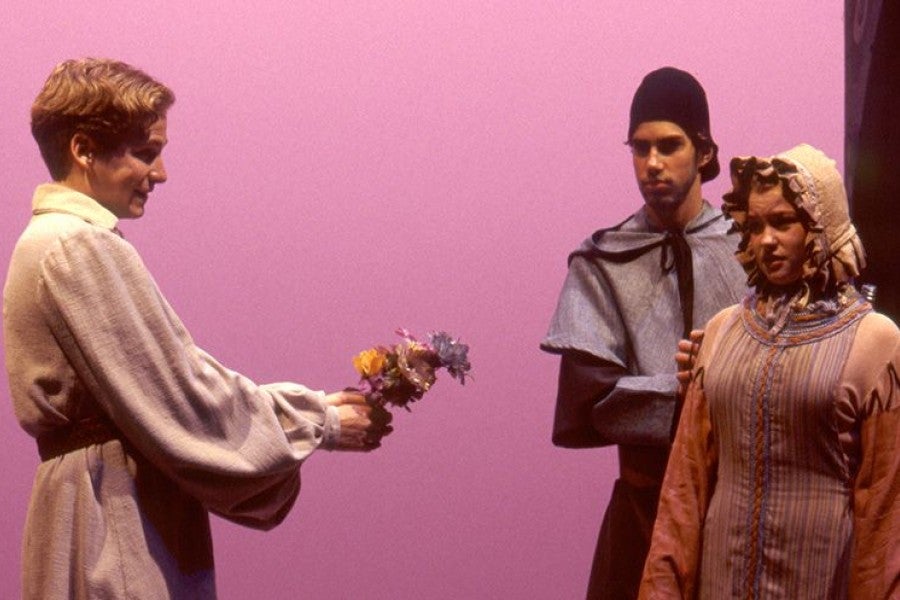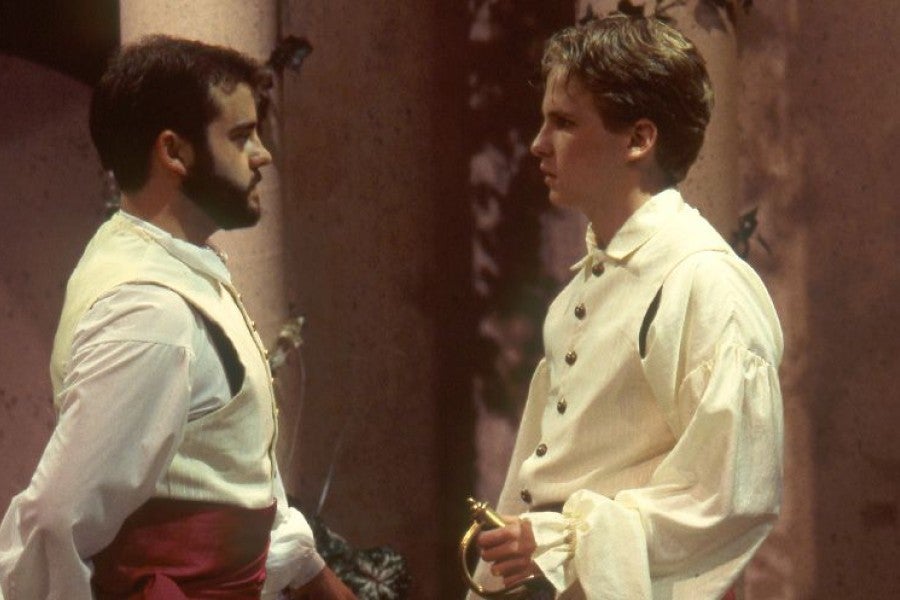Interlochen Online's next session begins May 6—enroll in any course or certificate program now.
Finding pride in your work
Actor and playwright Ryan Spahn opens up about his life, career, and his time at Interlochen Center for the Arts.
With several dozen productions under his belt, the bulk of Ryan Spahn’s (IAA 95-98) acting credits are from plays written within this era.
“I do like contemporary, but I think more than contemporary—I like new,” Spahn told Crescendo during a recent interview. “I like working on new plays. That’s what I gravitate toward.”
From starring in the original Off-Broadway cast of Branden Jacobs-Jenkins’ Pulitzer Prize finalist play Gloria to playing the eponymous spouse in three different productions of Michael McKeever’s Daniel’s Husband—Spahn has found a niche for himself working with his friends and colleagues on their intricate, dialogue heavy-shows.
This June, however, Spahn will be asking his peers to assist him in exhibiting a play of his own as part of Pride Plays—an upcoming festival of play readings in New York City designed to commemorate the 50th anniversary of the Stonewall Uprising.
Spahn’s show, Nora Highland, is one of a dozen shows by LGBTQIA artists on the Pride Plays’ lineup, which includes classic and new works by notable playwrights Paula Vogel, Terrence McNally, and Michael Benjamin Washington.
Continue reading below for more from Spahn’s interview with Interlochen Center for the Arts.
Did you always want to be an actor?
When I was 11 or 12, I went to see a production of A Christmas Carol at Meadow Brook Theatre in Rochester, Michigan. I went home and thought, “I want to be in that play. I want to do that next year.” So, I went to the local library in Troy and began researching, “What is an agent?” and stuff like that. All of this was back before the internet, so I had to do the actual legwork myself. The following year, I got cast in that same production of A Christmas Carol. That’s when I first met Dan Amboyer and other future Arts Academy alumni.
How did you learn about Interlochen?
When I was 14, I read an article about Robin Williams and how he had attended The Juilliard School. So, I called up Juilliard and asked the woman who worked in the drama division, whom I believe was Kathy Hood, how to get into the school. She said, “Oh, there’s a great boarding school in Michigan called Interlochen. You should go there if you want to come to Juilliard.” And so that’s what I did.
How was your experience at Interlochen?
Interlochen was groundbreaking for me. I was having a hard time at my public high school. It was awful. I was being teased and ridiculed. It was bad. But, I found that at Interlochen, being weird was what life was all about. It was embraced and encouraged. Interlochen changed the entire narrative of what “normal” even meant to me. After graduation, I felt like the damage that had occurred to me in my early high school years had been resolved.
Could you talk about your artistic training?
At Interlochen, I definitely didn’t engage with the theatre training as deeply as I could have because I was so overwhelmed with how it was fulfilling me personally. After high school, I didn’t head to college. I moved to Los Angeles and quickly found myself in an acting class where I could build upon the foundation I had developed at Interlochen. Within a year, I was studying with Michael Woolson. He taught me a lot.
How was coming straight from Interlochen to L.A.? Do you suggest acting classes to all young actors who don’t head straight to college?
If a student decides not to go to college, they should think about getting into an acting class. It is the smartest thing somebody can do if they move directly to L.A. or New York. Beyond the training, they’ll develop an immediate friendship circle. They’ll want that camaraderie, especially since they’re coming out of Interlochen—they’re used to deep friendships with those with whom they are learning. And those initial friendships will become very important to their lasting happiness. Those classes are how I landed my first agent and manager. People introduced me around. It was great. I’m still very close to some of the people from that time in L.A., even though it’s been years.
You did, however, eventually end up attending Juilliard?
Yeah, like 15 years later! I even got to thank Kathy Hood personally for suggesting I attend Interlochen. She was still working in the drama division. I made a lot of great connections during my time there. I met Branden [Jacobs-Jenkins], and if it wasn’t for that initial collaboration with him during school, I might never had been cast in his play, Gloria, which was my off-Broadway debut.
You’ve been in several shows where you’ve known the playwright personally, right?
Yeah. I’m very good friends with the Moscow Moscow Moscow Moscow Moscow Moscow playwright, Halley Feiffer. That’s the play I’m rehearsing right now at MCC Theater in New York. We are very close; we even wrote a movie together called He’s Way More Famous Than You. Halley wrote the part of Kulygin for me in Moscow (x6). Thank God, otherwise I might not be in her fantastic play!
It’s uncommon for me to get a job from simply walking into a blind audition and being like, “What’s up? I’m Ryan. Here’s my audition. Thank you!” I get work because my friend writes something for me, or because I’m close to the director, or because someone sees me in a show. Even with Summer and Smoke, which I recently did off-Broadway at Classic Stage, the director, Jack Cummings III, had seen me in an early production of Daniel’s Husband before we transferred to the Westside Theatre. Jack and I talked after the show, and he told me how much he’d responded to my work. So, when I heard that the revival of Summer and Smoke was happening, I emailed Jack directly.
That’s tenacious.
I don’t think it’s tenacious. Someone once told me that your agent gets 10% commission. So, they’re really only doing 10% of the work. If you’re lucky! It’s up to you to do the other 90%.
Tell us about your involvement in Pride Plays.
Nora Highland is about how brutal the casting process can be when you're openly gay. Something I’m very familiar with. It’s being read on June 24 at The Rattlestick Playwrights Theatre. It’s directed by Danya Taymor and stars Rebecca Henderson and Michael Hsu Rosen. It was a finalist for the 2019 O'Neill Playwrights Conference.
Why is writing so important to you?
When you’re simply an actor, you have to wait to be asked to work. You don’t have much control. When you’re a writer, you can do that whenever you want. It’s an outlet that helps me stay grounded. The goal is to always stay grounded.
Visit rattlestick.org to learn more about Pride Plays, and you can follow Spahn on social media via Instagram and Twitter.
